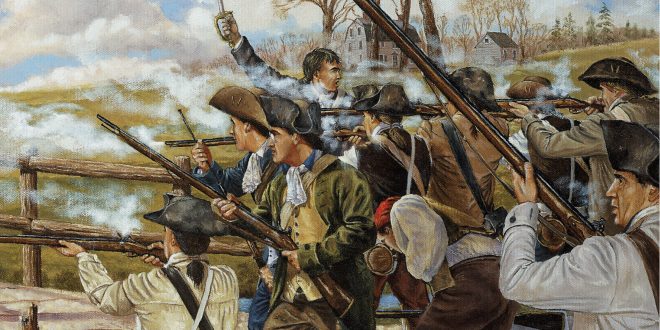
AMERICA’S FIRST NATIONAL INSTITUTION
Since its official establishment, June 14, 1775 — more than a year before the Declaration of Independence — the U.S. Army has played a vital role in the growth and development of the American nation. Drawing on both long-standing militia traditions and recently introduced professional standards, it won the new republic’s independence in an arduous eight-year struggle against Great Britain. At times, the Army provided the lone symbol of nationhood around which patriots rallied.
For many colonists, the revolutionary spirit was forged in dialogue with their friends and neighbors. Small gatherings afforded an opportunity to air concerns and share ideas for the best response to increasingly offensive British regulation. (Print Courtesy of U.S. District Court for the District of New Hampshire)
JUNE 14, 1775
Establishment of the Continental Army
On June 14, 1775, the Continental Congress passed the following resolution:
Resolved, That six companies of expert riflemen [sic], be immediately raised in Pennsylvania, two in Maryland, and two in Virginia; … [and] that each company, as soon as completed [sic], shall march and join the army near Boston, to be there employed as light infantry, under the command of the chief Officer in that army.
June 15, 1775
Selection of George Washington as Commander in Chief
The next step was to select a commander in chief. George Washington of Virginia was the favored choice because of his celebrated military record and the hope that a leader from Virginia could further unite the colonies. Congress unanimously voted on the measure, and the next day presented Washington his commission. It read, in part:
“We, reposing special trust and confidence in your patriotism, valor, conduct, and fidelity, do, by these presents, constitute and appoint you to be General and Commander in chief, of the army of the United Colonies, and of all the forces now raised, or to be raised, by them, and of all others who shall voluntarily offer their service, and join the said Army for the Defence [sic] of American liberty, and for repelling every hostile invasion thereof: And you are hereby vested with full power and authority to act as you shall think for the good and welfare of the service.”
Thus the Continental Congress commissioned George Washington as commander in chief of the Continental Army, June 19, 1775.
EVENTS LEADING UP TO 14 June
MARCH 25, 1774
Boston Port Act — Start of the Intolerable Acts
In the wake of the Boston Tea Party, the British Parliament closed the port of Boston to ships with its passage of the Boston Port Act, which took effect June 1, 1774. It was the first of the Coercive, or Intolerable Acts, five laws passed by the British Parliament to suppress resistance to its authority over the American colonies.
MAY 20, 1774
Massachusetts Government Act
The second act, the Massachusetts Government Act of May 20, 1774, stripped the colony of its sovereignty. Many throughout the 13 colonies viewed this act as the most egregious of the Intolerable Acts and feared the British might impose similar laws on each of the rest of the colonies.
Tensions heightened when Lt. Gen. Thomas Gage, the commander in chief of British forces in North America and royal governor of the Massachusetts Bay Colony, invoked the new law in October 1774 and dissolved the provincial assembly. In response, colonists formed their own alternative government — the Massachusetts Provincial Congress, which controlled the entire colony outside of Boston — and prepared for a possible military confrontation with the forces that occupied the capital.
APRIL 19, 1775
Battles of Lexington and Concord — The Start of the Revolutionary War
Upon learning that this extra-legal government was amassing stores of weapons in Concord, about 20 miles from Boston, Gage sent a military expedition, April 18, 1775, to seize and destroy all the munitions his men could find. This led to an exchange of musketry between local militia and British troops at the village green in Lexington and at the Old North Bridge in Concord, April 19, 1775, signaling the start of the Revolutionary War.
Militia units and other volunteers from Massachusetts and other New England colonies quickly converged on Cambridge. They formed what became known as the New England Army of Observation and put the British forces posted at Boston under siege. For the time being, the rebellion was a regional affair.

MAY 10, 1775
Convening of the Second Continental Congress
Now that the fighting had begun, the Massachusetts Provincial Congress looked to the Continental Congress, which convened on May 10 in Philadelphia, for assistance from the other 12 colonies of British America. After much discussion, the delegates resolved to create an army that would represent not just New England, but all of the British colonies on the continent of North America.
https://www.sofmag.com/the-continen...-infantry/?fbclid=IwAR2XdEnrZYrU5I-tQTfhdWRQ8PSPiZJda70ZCoYlCAxhUrJRTr9PiZwj37A




